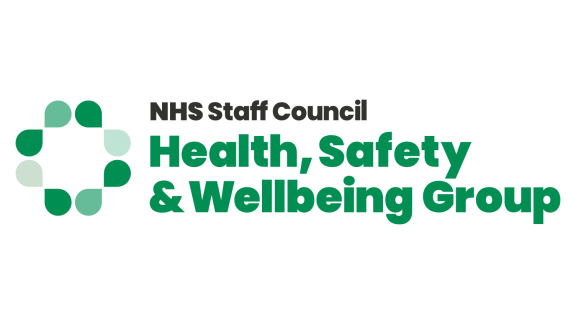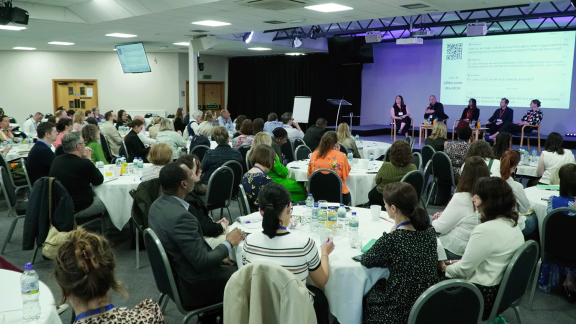Supporting our NHS people experiencing stress
22 October 2024

Stress is something that everyone feels at times. Work-related stress is defined by the Health and Safety Executive (HSE) as 'the adverse reaction people have to excessive pressures or other types of demand placed on them’. It is more prevalent in public service occupations, such as health and social care.
The NHS has been identified as having higher than average stress-related sickness absence, compared to all job sectors across the country. Stress, alongside anxiety and other psychiatric illnesses, is consistently the most reported reason for sickness absence in the NHS, accounting for over 476,000 full-time equivalent days lost (NHS Digital Statistics).
The 2024 NHS annual survey revealed that 41.6 per cent of staff report feeling unwell as a result of work-related stress (remaining stable compared to 41.8 per cent in 2023).
The We Are the NHS: People Plan for 2020/2021 focuses on ‘looking after our people’, by prioritising the wellbeing of NHS staff to ensure they are safe and healthy at work and can deliver high-quality patient care.
It's therefore essential to address how stress experienced both inside and outside of work can affect our NHS people and their ability to provide good care. It is crucial for organisations to be well-equipped to support those experiencing stress.
This web page details the different types of stress, and how stress can manifest, as well as providing top tips to support NHS colleagues.
-
It is both important and beneficial that initial indicators of stress are detected. It is also important to intervene early, before an employee becomes unwell and the pressures feel unmanageable. The best way to detect whether an individual might be experiencing stress is by being alert and aware. Knowing and listening to your staff members is essential, considering them as a whole and recognising what may be out of character for them, as reactions to stress are individual.
The Chartered Institute of Personnel and Development (CIPD) created factsheets to help detect changes in behaviour and performance that could be initial indicators that employees are suffering from excess pressure, caused directly or indirectly from the workplace. These could be:
- work performance - inconsistent performance, uncharacteristic errors, lack of motivation, working longer hours, skipping breaks
- emotional signs - overreactions, crying, undue sensitivity
- aggressive behaviour - malicious gossip, temper outbursts, bullying
- withdrawal - absenteeism, limited social contact, leaving early
- physical signs - nervous speech, sweating, reporting/increase of headaches.
Other signs can include increased alcohol intake, smoking, lack of interest in appearance and accidents at home/work.
-
Educating and informing all your staff, rather than just line managers, of the early signs of stress is an effective way of ensuring colleagues look out for each other, as well as encouraging people to connect and get to know one another to detect any behavioural changes that could indicate stress.
Using wellbeing champions and ensuring all staff are aware of internal wellbeing support and further services by signposting these through a variety of channels for example, posters, flyers or QR codes for frontline workers with limited access to a laptop are all ways of achieving this. By encouraging an open and honest culture, individuals experiencing symptoms of stress will hopefully feel more able to approach colleagues and/or services in the initial stages.
Specifically, line managers are encouraged to have regular open and honest health and wellbeing conversations with employees, which should help to identify early signs of stress. Taking time to ask about an individual’s life and circumstances beyond work, as well as asking ‘how are you?’ are effective ways to get to know your colleagues. To help your line managers implement effective wellbeing conversations that encourage colleagues to raise issues arising from stress both personally and at work, share our health and wellbeing conversations web page, which contains helpful information, top tips and wellness action plans.
-
There are several different types of stress that can contribute to an individual feeling like they are unable to cope with the pressures and demands whilst at work, caused by circumstances inside and outside of work.
Whilst not exhaustive, the following list notes some of the stressors that contribute to an individual feeling stressed:
- homelife-related stress (including family and childcare responsibilities)
- organisational change
- changes to workload
- significant life events (e.g. moving home, marriage, divorce)
- financial wellbeing and changes
- global pandemics
- illness.
Burnout
Burnout refers to an emotional, mental and physical state of exhaustion, caused by excessive and prolonged periods of stress. In an Keeping Well NHS article, burnout is described as a feeling of ‘not enough’, be that not enough energy, time, enthusiasm or ability. Common in health and social care occupations, it can result in a poorer physical state, mental health problems, reduced job satisfaction, absenteeism and professional errors.
Whilst burnout is a type of stress with overlaps in symptoms, the main difference is that stress is associated with a feeling of ’too much’, whereas burnout relates to a feeling of ’not enough’.
Signs and symptoms of burnout are:
- physical - feeling tired and drained, lowered immunity, change in appetite
- emotional - sense of failure and self-doubt, decreased satisfaction and sense of accomplishment, loss of motivation
- behavioural - isolating from others, procrastination, withdrawing from responsibilities.
Caring for patients during the pandemic has taken a significant toll on health and social care staff, impacting on their wellbeing and contributing to feelings of stress and burnout. The NHS Reset campaign outlines how the pressures of the COVID-19 pandemic have inevitably exacerbated the prevalence of burnout in our NHS people due to the intensity of workload, pressures and circumstances. In a recent survey, NHS Providers found that 92 per cent of staff agreed with the statement ‘I am concerned about staff wellbeing, stress and burnout following the pandemic’, reinforcing the need to focus on staff wellbeing surrounding burnout when restoring NHS services.
You can read further details about burnout prevention and treatment on the HelpGuide website.
COVID-related workplace stress
The pandemic has resulted in some NHS staff feeling particularly worried and anxious. COVID-related workplace stress is an overwhelming, yet essential, area to consider during the ever-evolving and uncertain times. People react differently, but some common fears, anxieties and stressors about COVID-19 related to work are:
- Exposure to the virus either during the commute to or at their workplace
- Bringing the virus home and infecting family members
- Changes in work role practices
- Dealing with changing work patterns/shifts
- Loss of control over usual working routine
- Being redeployed
- The impact of the crisis on job performance/future career
Due to the pandemic, there has been a significant increase in the number of NHS colleagues working from home, meaning usual face-to-face meetings take place virtually through a laptop or onscreen device. This can have a negative impact on an individual and they may experience symptoms of screen fatigue (eye strain), which include symptoms such as blurred vision, neck and shoulder pain and trouble concentrating, all of which can contribute to heightened feelings of stress. Managers should promote taking regular breaks where possible, as well as encourage teams to consider and continually review the length and frequency of meetings.
Some employees may experience stress as a result of having previously contracted the virus, and could be living with long COVID symptoms. Read how to support people in the recovery of long COVID.
Trauma
Broadly speaking, trauma refers to the emotional response to a stressful, frightening or distressing event. It is normal to have an emotional reaction to a stressful and traumatic situation, but in some cases, the effects can be long-lasting and severely impact an individual’s life. Employers should be mindful that our NHS people may have experienced trauma from events stemming both inside and/or outside of work, with the psychological response impacting their job role. This reiterates the importance of ensuring managers really know their colleagues and take the time to see how they are feeling.
Post-traumatic stress disorder
Post-traumatic stress disorder (PTSD) is an anxiety disorder caused by a traumatic event. It is especially challenging for people experiencing it and can impact on how a person feels about whether they are able to cope with the demands of their work. They may experience feelings of irritability, isolation and guilt, often reliving the event through flashbacks and nightmares. PTSD symptoms may occur soon after exposure to a traumatic event or may be delayed by months or years, and are particularly common in occupations with a high risk of trauma exposure, such as those responding to emergency medical situations.
In relation to the NHS workplace, a large-scale survey launched by the Nursing Times in April 2020 revealed that one in seven NHS people respondents reported having PTSD symptoms. Recent research by Neil Greenberg looked at NHS staff working in critical care, who reported twice the rate of PTSD typically found in military veterans, highlighting the relevance and importance of knowing how to support staff suffering from PTSD.
Moral injury
Moral injury is defined as ‘psychological distress which results from actions, or lack of them, that violate someone’s moral or ethical code’. In traumatic or unusually stressful situations, people may witness or fail to prevent unforeseen events that contradict their deeply held beliefs and morals. Someone experiencing moral injury may have feelings of anger, guilt, shame or disgust, which can lead to PTSD, depression and possibly suicidal thoughts. The COVID-19 pandemic has meant that NHS practitioners have been required to make very difficult decisions, at times compromising their professional values which can lead to moral injury and distress. Given the ongoing pandemic, it is therefore now more important than ever to raise awareness of the risks of moral injury and encourage people to discuss their feelings openly.
To support employees who may be experiencing moral injury, it would be beneficial to ensure professional psychological support is readily available so that line managers can direct colleagues, provide informal support by trained peer supporters and tailor the support to address feelings of guilt and/or shame.
-
Employers can have a major influence on employee productivity and wellbeing, and can actively help to reduce the stress their colleagues may experience.
As a HWB lead, you can support managers by making them aware of the following:
- National and local offers – encourage managers to know about and use national and local offers that are available to support our NHS people.
- Clearly signpost – It’s essential that all employees are aware of the help and services provided internally and externally to individuals requiring support. Ensuring that signposting is available in different mediums for instance leaflets, posters, flyers, web pages, QR codes, or documents. Ensure any channels used consider the reach to all clinical and non-clinical staff.
- Back to basics – promote the value of investing in self-care. Support colleagues to recognise their own behaviours by encouraging them to integrate acts of self-care into their day to help with rising stress levels. Some suggestions could be to encourage staff to connect with friends/loved ones, go for meals, listen to music or stroke a pet.
- Timely manner – evidence points towards early detection of stress and trauma to be key in recovery and avoiding further mental unwellness. This allows for a timely referral to support services before the individual becomes overwhelmed and impacts their perceived ability to cope at work.
- Educate – it may be necessary in the longer term to actively monitor staff for traumatic stress reactions. It is normal to have an emotional reaction to a stressful and traumatic situation, but in some cases, the effects can be long-lasting and severely impact an individual’s life. This is best achieved by alert, sensitive and compassionate managers, and it could be beneficial for staff and their families to receive information on the symptoms and indicators to look out for.
Peer Support
- Buddying system – implementing a buddying system allows colleagues to connect and share experiences with team members, allowing for essential reflection and decompressing of challenging work situations. Having a buddy means your staff feel more connected, including and part of a team, as well as enabling colleagues to detect any early signs of work-related stress. This may be particularly beneficial for frontline shift or ambulance workers who rotate shifts frequently and may not have a group of colleagues they see regularly.
- Positive relationship with line managers - Evidence from King's College London suggests that a positive relationship between staff and immediate managers is critically important. Offering your line managers training (e.g. TRiM and REACT – see below) to increase confidence when holding open and honest conversations where supervisors feel equipped to explore responses from their team a little further, can reduce sickness absence by up to 90 per cent. Meeting regularly with employees would be beneficial, where managers can help employees adapt and cope and communicate any changes.
- Trauma Risk Management (TRiM) – this formal peer support system aims for any employee exposed to trauma at work to be properly supported. Acting in a timely manner, the system aims to put into place early intervention and appropriate support where early psychological symptoms are not resolved. It includes psycho-educational briefings, time after the traumatic event to decompress, and access to medical and psychological services.
- REACT Mental health conversation training – Underpinned by psychologically sound principles, the technique comprises of Recognise, Engage, Actively listen, Check risk, Talk about specific actions. The REACT mental health training will help colleagues to identify people in their teams who may be struggling with stress, allowing for a supportive and compassionate conversation to be had.
- Team togetherness – Team huddles are a quick, small and useful aid to regularly process the day’s events in order to reduce stress. Huddle facilitators guide a person, group or team through a discussion of the day’s shift and events. Allowing employees to share any challenges of their day, huddles give people time to stop, think and be with their colleagues during times of stress and/or trauma.
-
South Tees Hospitals NHS Foundation Trust
The trust's medical psychology team created the 'Coronacoaster' - a self-guided recovery journey - to support staff during the emotional rollercoaster of the COVID-19 pandemic. Coronacoaster consists of a series of films to help support colleagues to recover from the stresses, pressures and traumas of the past two years. The pathways are designed to help those feeling stuck in the midst of the stresses, those ready to reflect and look to the future, as well as assisting those not feeling ready to face and tackle these experiences.
Staff have found the videos to be incredibly helpful and accessible, their well-presented and easy-to-watch nature allows staff to take time to reflect on their own personal journey. The videos have increased the psychological awareness of staff and given staff tools to help manage their journeys, bringing compassion to themselves and their colleagues who may be at different stages. Many staff members have reached out for further support as a result of watching the videos.
Tavistock and Portman NHS Foundation Trust
The trust piloted a stress and resilience framework, commissioned by Health Education England (HEE). It focused on what organisations can do the support staff experiencing stress, rather than making the individual more resilient. The framework offers a new perspective to challenge colleagues and organisations to view stress differently, incorporating five key pillars: leadership/management style, structure and processes, psychological safety, beliefs, attitudes and behaviour and the nature of the work.
Find out more on how your organisation can get involved with this framework by emailing workforce@tavi-port.nhs.uk
Epsom and St Helier University Hospitals NHS Trust
The trust offered training to health and wellbeing leads and staff on how to have wellbeing conversations to get to know the individual as a whole, as a way to support employees experiencing stress at work. They were encouraged to have these conversations at the start of the induction process to act as a prevention to unmanageable stress levels. Introducing Schwartz rounds gave staff members the opportunity to express their experiences, feelings and stories, allowing them to decompress and reflect on challenging events with colleagues that may increase stress or trauma levels.
Chesterfield Royal Hospital NHS
They use the ‘huddle’ approach as a useful aid to regularly process the day’s events in order to reduce stress. The trust also has more structured incident response tools such as REACT mental health training, one-to-one counselling and top-level psychological support, such as eye movement and desensitization and reprocessing (EMDR) options.
Lincolnshire Partnership NHS Foundation Trust
The trust has developed a tool called the ‘circle of wellbeing’. Taking a holistic approach, the tool focuses on eight different areas such as mental health, nutrition, sleep, work-life balance and connectedness. It enables an individual to self-assess how the areas are impacting their ability to cope with perceived stress through workshops and follow-up reviews. Feedback from employees has been very positive. They are finding it helpful to identify a couple of areas to focus on and subsequently make positive changes. In-house support and necessary signposting to various resources are available to staff following this, depending on the areas they need and want help with.
South East Coast Ambulance NHS Foundation Trust
The trust has a wellbeing hub that provides employees with a single point of access is wellbeing support, including TRiM for stress management. The hub allows for managers and peers to contact them for support and advice if concerned about a colleague, which is particularly important when working on ambulance rotation shifts where an individual may not regularly see their line manager. The trust has also created the ‘backup buddy’ app, which provides a wealth of information to support wellbeing and is also available to family and friends who are crucial to supporting our NHS people.
They have a range of stress resources provided at the wellbeing hub including:
Sheffield Teaching Hospitals NHS Foundation TrustThe trust shares a useful poster that clearly and succinctly identifies signs and symptoms that a colleague could be struggling with stress and could need further support.
Wrightington, Wigan and Leigh NHS Foundation Trust
The trust has approximately 30 trained people trained in critical incident stress management (CISM). They support staff who have experienced an event that causes significant emotional and physical distress. Briefing and defusing sessions are followed up and colleagues signposted to any necessary psychological support service, for example counselling for anxiety, bereavement and/or cognitive behavioural therapy. Embedding CISM into their service has resulted in a reduction in days lost due to sickness in both the short and long term.
Doncaster and Bassetlaw Teaching Hospitals NHS Foundation Trust
The trust introduced an onsite reiki practitioner who runs free stress-relieving sessions. The feedback shows sessions to be highly effective, with staff finding it to keep them at work rather than going off sick. The trust is exploring further holistic therapy options, such as reflexology and acupuncture.
-
There are a wealth of resources, toolkits and information to help combat stress and mental health problems in the workplace make positive improvements to emotional wellbeing and reduce work-related stress. We have developed some tools as well as collated information for you to use in your NHS organisation.
- The Health and Safety Executive (HSE) Management Standards Indicator tool: This survey tool consists of 35 items asking about working conditions to identify potential causes of work-related stress based on the six management standards.
- Post-traumatic stress guidance: The National Institute of Clinical Excellence (NICE) has written guidance on recognising, treating and assessing PTSD in adults. It is aimed at professionals who work with people at risk of PTSD, specifically NHS trust managers.
- Recovering at work (PDF): City Mental Health Alliance and Centre for Mental Health have produced a guide to help organisations become 'trauma-informed' so that they can support their people through psychological and emotional trauma experiences.
- Sickness absence toolkit: access our simple guide which aims to support and give NHS managers confidence, so that they can in turn support their staff and manage sickness absence well.
- Stress in the workplace: The Chartered Institute of Personnel and Development (CIPD) has created useful factsheets to help you identify the signs of stress, address stress at work and distinguish between stress and pressure.
- Supporting mental health at work: ACAS guidance on why it’s important to take good mental health seriously at work.
- Supporting Mental Health of Employees During and Beyond COVID-19 (PDF): AXA Asia and the World Health Organisation (WHO) have collaborated to produce a toolkit that helps managers to anticipate and act effectively to support employees’ mental health during COVID-19 and beyond.
- Supporting our NHS People: NHS England has a suite of resources available to NHS staff to help manage your own health and wellbeing while looking after others. The web page contains lists of support services, free apps and events to support staff wellbeing.
- Talking Toolkit (PDF): The Health and Safety Executive (HSE) have produced a talking toolkit specifically for NHS Service Providers to support six conversational areas surrounding work-related stress.
- Listen to Acas’s Work-related stress: lifting the pressure at work podcast where Acas Head of Mental Health and Wellbeing, Francoise Woolley and HSE Policy Lead for work-related stress and mental health, Rob McGreal talk about identifying the causes of work-related stress and supporting mental health and wellbeing at work.
- The Health and Safety Executive (HSE) and the Working Minds campaign have released a free online tool to help employers prevent stress at work and support good mental health. The interactive tool comprises six short modules, which cover everyday scenarios, possible causes of stress, minimising stress at work and how to comply with employment law in this area. It includes games and quizzes and is designed to take less than an hour to complete. Find out more here.
- Unmind and Headspace currently offer free access to their apps for NHS staff.



